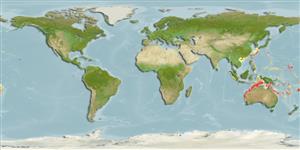Elasmobranchii (sharks and rays) >
Carcharhiniformes (Ground sharks) >
Pentanchidae (Deepwater catsharks)
Etymology: Halaelurus: halos (Gr.), sea; ailouros (Gr.), cat, probably an allusion to the vernacular “catshark,” so named for its cat-like eyes (See ETYFish); sellus: From sella (L.), saddle, referring to dark saddles on head and body (See ETYFish).
More on authors: White, Last & Stevens.
Environment: milieu / climate zone / depth range / distribution range
Ecology
Marine; demersal; depth range 62 - 164 m (Ref. 59315). Tropical
Eastern Indian Ocean: Australia.
Length at first maturity / Size / Weight / Age
Maturity: Lm ?, range 38 - ? cm
Max length : 35.3 cm male/unsexed; (Ref. 59315); 42.3 cm TL (female)
Inhabits continental shelves (Ref. 59315).
Life cycle and mating behavior
Maturity | Reproduction | Spawning | Eggs | Fecundity | Larvae
White, W.T., P.R. Last and J.D. Stevens, 2007. Halaelurus maculosus n. sp. and H. sellus n. sp., two new species of catshark (Carcharhiniformes: Scyliorhinidae) from the Indo-West Pacific. Zootaxa 1639:1-21. (Ref. 59315)
IUCN Red List Status (Ref. 130435: Version 2024-1)
Threat to humans
Harmless
Human uses
Tools
Special reports
Download XML
Internet sources
Estimates based on models
Preferred temperature (Ref.
123201): 18.9 - 27.6, mean 25 °C (based on 194 cells).
Phylogenetic diversity index (Ref.
82804): PD
50 = 0.5078 [Uniqueness, from 0.5 = low to 2.0 = high].
Bayesian length-weight: a=0.00355 (0.00175 - 0.00721), b=3.08 (2.90 - 3.26), in cm total length, based on LWR estimates for this (Sub)family-body shape (Ref.
93245).
Trophic level (Ref.
69278): 4.3 ±0.5 se; based on size and trophs of closest relatives
Resilience (Ref.
120179): Low, minimum population doubling time 4.5 - 14 years (Preliminary low fecundity).
Fishing Vulnerability (Ref.
59153): Moderate vulnerability (38 of 100).
